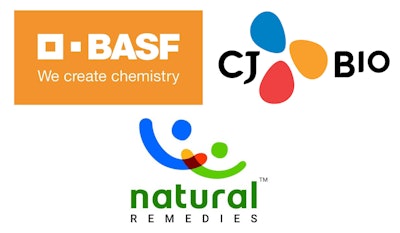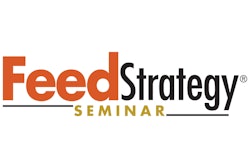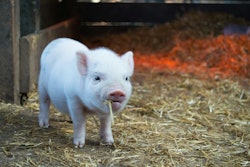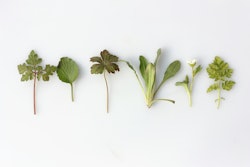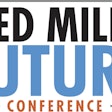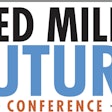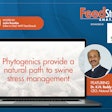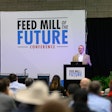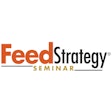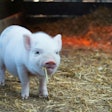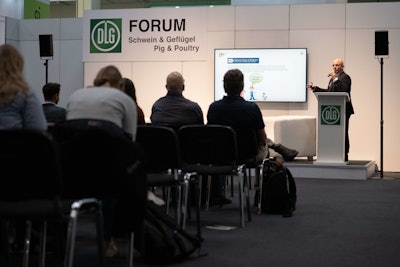
The 2024 Feed Strategy Seminar series, held at EuroTier 2024, will provide insights into feed additive solutions for emission reductions in monogastric animal production. The 50-minute sessions will focus on practical, non-commercial, science-based approaches to improving swine and poultry’s environmental impact through feeding.
Three sessions – two for swine and one for poultry – span three days. Held on the technical forum stages in either the poultry or swine hall, each seminar will cover the latest animal feed additive research and solutions for emissions reduction. Admission is free.
This edition of EuroTier will be held November 12-15, 2024, at the Deutsch Messe in Hanover, Germany.

Feed additive solutions for reducing emissions in swine and poultry production
Location: Deutsch Messe, Hanover, Germany
- SWINE SESSION | Nov. 12, 2024 | 16:00-16:50 | Swine Technical Forum Stage
- POULTRY SESSION | Nov. 13, 2024 | 10:30-11:20 | Poultry Technical Forum Stage
- SWINE SESSION | Nov. 14, 2024 | 14:00-14:50 | Swine Technical Forum Stage
SWINE SESSION | Nov. 12, 2024 | 16:00-16:50
Adaptogen: An innovative approach to animal stress management
Speaker: Professor Juan Carlos Illera Portal, Universidad Complutense de Madrid
Stress management in swine during grouping and regrouping, and aggressive behavior are long-presented challenges that lack effective solutions for making animals stress free. However, the introduction of NR-Adaptogen offers a significant advancement in controlling stress by demonstrating the ability to reduce cortisol levels by 50%. This finding is substantiated by evidence from studies examined in milk, cortisol, cholesterol, serum and saliva, highlighting the potential of NR-Adaptogen to improve welfare and productivity in swine management.
Learning points:
- Stress hormone in monogastrics and its impact on animal productivity
- Measurement of stress in swine
- Factors responsible for aggressive behavior of swine
- NR adaptogen, a natural solution for improving animal welfare and productivity
- Exploration of technical science behind NR Adaptogen
POULTRY SESSION | Nov. 13, 2024 | 10:30-11:20
Reducing the environmental impact of feed with nutritional strategies leading to low CO2 emissions
Speaker: Dr. Diana-Christin Siebert, technical marketing manager, CJ Bio
Resource-efficient broiler production remains a key challenge for the feed industry. Lowering the dietary crude protein concentration to reduce the nitrogen excretion can be an effective tool if essential amino acids are well balanced using supplementary amino acids to fulfil the animals’ requirements. Furthermore, adjustments of the major raw materials can be applied to reduce the global warming potential of the feed or to increase the overall circularity. Feed additives can provide efficient tools to fine-tune the environmental impact of feed. CJ BIO is the only amino acid company producing eight feed amino acids providing the industry with the tools needed to reduce their environmental impact of animal feed. With feed grade amino acids, it is possible to reduce the feed crude protein concentration
Learning points:
- With feed grade amino acids, it is possible to reduce the feed crude protein concentration
- Reduced soybean meal content in feed is possible without compromising animals’ performance
- Amino acids and a smart selection of raw materials are keys to create a low CO2-footprint feed
SWINE SESSION | Nov. 14, 2024 | 14:00-14:50
Phytate, from antinutrient to sustainable nutrient source: Approaches to pig feeding without inorganic phosphorous
Speaker: Dr. Peter Ader, senior expert - feed enzymes, BASF Animal Nutrition
Approximately 60-70% of the phosphorus (P) in feed plant seeds is bound to phytic acid and cannot be utilized by swine and poultry species. The enzyme phytase releases P from the phytate, making it digestible to the animal. By using feedstuffs rich in phytate-P and adequate phytase dosages, complete inorganic P-free feeding of pigs from weaning to slaughter seems possible.
Learning points:
- Antinutrient phytate and interaction with phytase
- The use of phytase in animal nutrition, i.e. “phytase matrix”
- Approaches to inorganic phosphorus-free feeding for maximized reduction of phosphorus excretion and saving of phosphate resources
BIOGRAPHIES

Dr. Peter Ader is BASF Animal Nutrition‘s senior expert on feed enzymes. He studied veterinary medicine in Hanover, Germany, and earned his Ph.D. in digestive physiology in Zurich, Switzerland. Later, he became assistant researcher and lecturer at the Institute of Animal Nutrition, Physiology and Metabolism at the University of Kiel in Germany. In 2000, he started his career in the feed industry, focusing on feed enzymes – mainly phytase, xylanase and glucanase. For 20 years, Ader has been involved in the development, registration and launch of several feed enzymes that are part of BASF’s portfolio. In his position, he has built up profound knowledge on practical feed enzyme application, but also on enzyme development and enzyme properties. Ader has co-authored several peer-reviewed publications with a focus on pigs and poultry.

Dr. Juan Carlos Illera is a professor at Complutense University of Madrid (UCM) Department of Physiology – Animal Physiology. He earned his master’s degree in laboratory animal science at the University of California – Davis in the United States, and Doctorate in Official Postgraduate Program in Veterinary Sciences and graduate degree in Veterinary Medicine and Health Specialty from UCM in Spain.
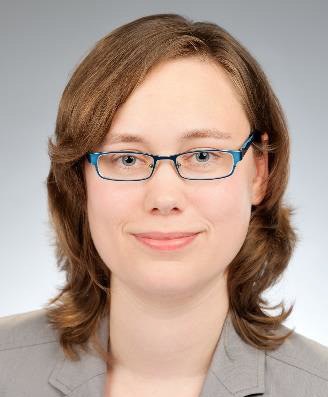
Dr. Diana-Christin Siebert is a technical marketing manager with CJ Europe GmbH. In this position, she focuses on amino acids and specialties and scientific responsibilities for monogastric and ruminant trials with internal stakeholders and external partners. Prior to joining CJ Bio Europe, she worked in R&D with dog food manufacturer Futalis GmbH, and as a research assistant with the Institute of Animal Nutrition (ITE) in Germany. Siebert earned her Doctor of Veterinary Medicine at the Institute of Animal Nutrition in 2014.
SPONSORED BY
